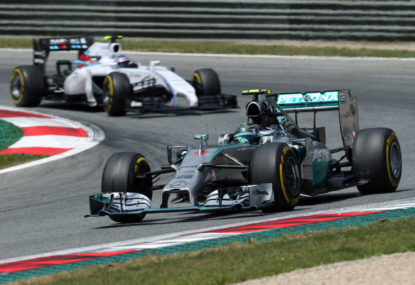Japanese Grand Prix talking points: Verstappen returns to winning ways as Perez solidifies grip on Red Bull seat
Red Bull and Max Verstappen vaulted right back to the top of the charts with a win in Suzuka, after his DNF in Melbourne.

Not for the first time in recent memory, Formula One is preparing to tweak the rules for the good of the fans.
Whether it be double points, standing restarts, sparking skid bocks, or the trashing of social media, our sport of sports is never afraid to lend an ear to its racegoers and legislate on their behalf.
Uh, right.
It seems, yet again, Formula One is set to introduce a rule change (or, more accurately, a fresh interpretation of an existing rule) to stifle team-to-driver radio communication in an attempt to answer a question being asked by exactly no-one.
It is impossible to think of any other sport – nay, any other organisation – so embroiled in denial that it is totally oblivious to the demands of the very people it purports to serve.
For all its regulatory tweaking ‘in the name of the fans’, not once have the fans been consulted, their opinions canvassed, or their perspectives engaged.
The latest in what is now a long line of misguided attempts to reverse the sport’s declining spectator and television viewer numbers is a ban on pit radio. The rationale behind the change is the (apparently) increasingly adopted point of view that certain radio communication detracts from the mystique of the racing driver.
When once they were revered as borderline super humans, today their work is understood in its intricacies and their status thusly diminished to merely mortal. It is harder to worship a driver if you could believe they live next door.
This issue came to light most prominently after Fernando Alonso and Sebastian Vettel’s scrap at Silverstone, to which a number of fans and commentators alike aired their dismay that the modern-day racing driver seemed prone to complaining.
It was a turn-off, they said, that the men driving these machines to their limits were whiners.
Other concerns have been raised regarding the perception that drivers are too reliant on information from the pit wall. Recommendations from engineers about passing strategy, target lap times, and other similar information contribute to the supposed understanding that drivers are little more than another part in the car.
The problem, it is suggested, is that this all makes Formula One something other than the spectacle it should be.
But, as I’ve written in the past, whether by way of outdated promotion strategy – or lack thereof – or its refusal to engage with the digital media platform, if Formula One is facing a problem, it is with its reluctance to communicate with its fans.
In the age of the MGU-H, MGU-K, ERS, KERS, DRS, power units, or the rather broad ‘electrics’, Formula One is as impregnable as it’s ever been for the casual fan.
It is often accused of being sterile or clinical and lacking the obvious human element so easily expressed by athletes in other sports who aren’t hidden from fans by the cockpit, helmets, and 300 kilometres per hour.
Removing those few brief audio snippets that reveal the genuine side of drivers who are ordinarily disinclined to share their personalities with the media can only make the sport colder. The aim of the game should be more information, not less.
More than they crave choice, a fan craves options. A fan wants to feel engaged, but can only do so if they have the tools at their disposal. Yet decisions like that made by FOM to remove any usable data from its live timing page, presumably to push people towards its comprehensive (but costly) mobile app, are precisely the sort driving fans away. Restricting team radio communication would be yet another blow to fan engagement.
Speaking to radio restriction, McLaren racing director Eric Boullier told Autosport.com, “The constraint we have this year is less fuel and harder tyres, and I understand it may be a confusing message for the fans that the drivers have to save tyres and they have to save fuel”.
In other words, the sport remains absurdly steadfast in its belief that the route to engagement is in reducing access. That the sport thinks it will become more popular by making itself less comprehensible to the average viewer is testament to this.
This belief is not only misguided, it is damaging. The only result of Formula One’s crusade to limit accessibility will be fans continuing to switch off in search for something offering them the opportunity to engage on their level.
So I hope next time a decision is made for the fans, someone does them the courtesy of asking them first.
Michael Lamonato is on Twitter using the deeply uncreative handle @MichaelLamonato